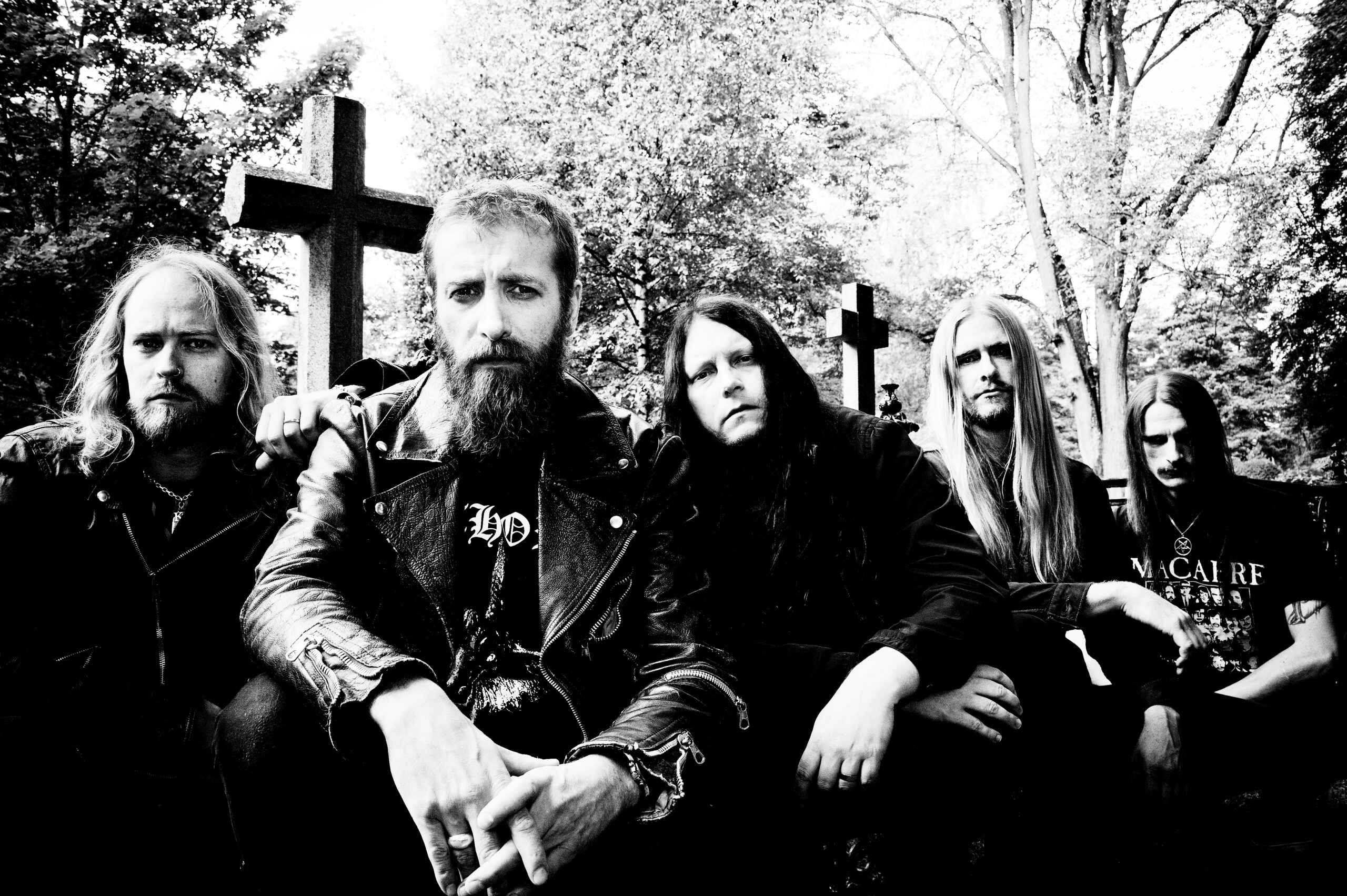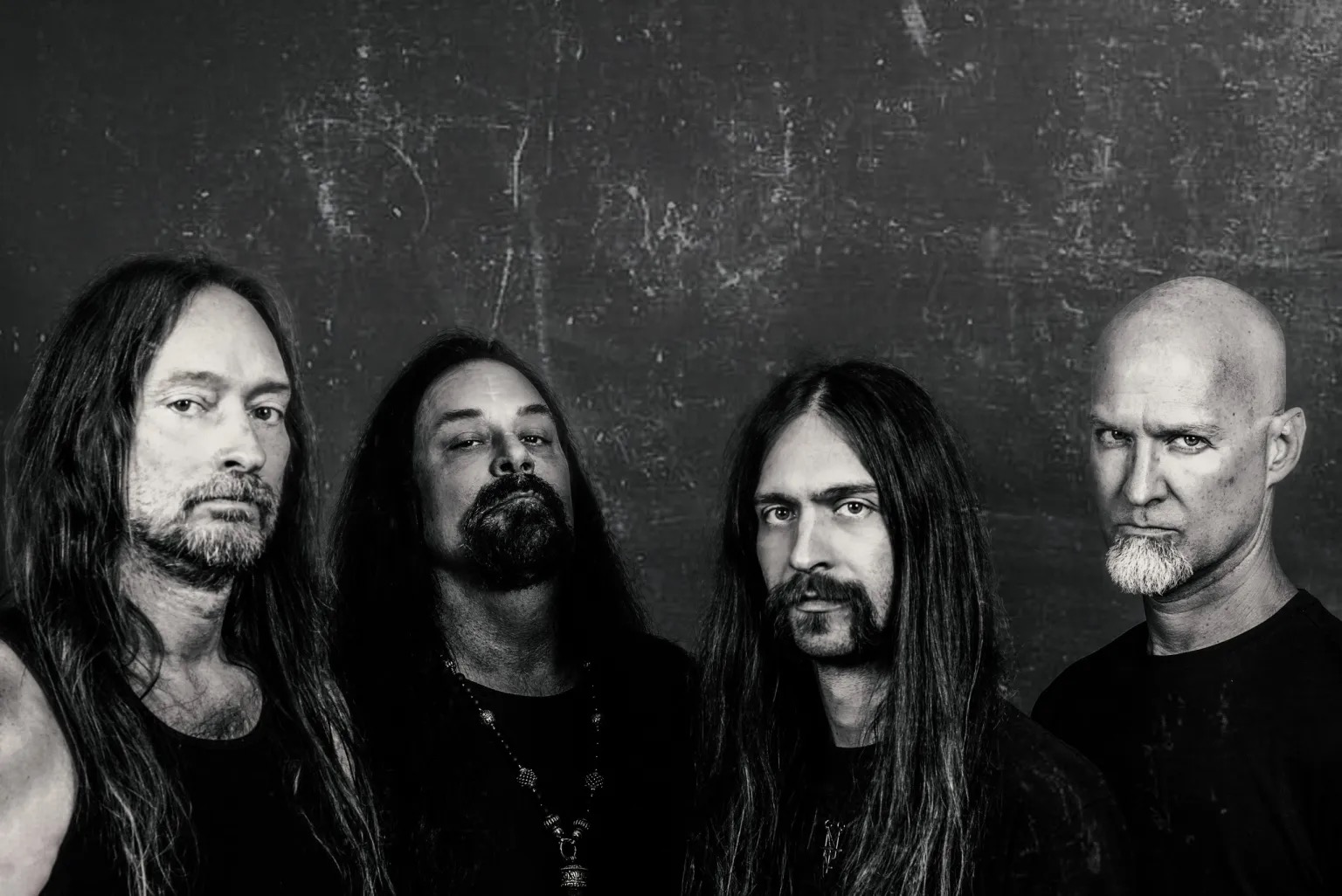Over the years, Trivium have delivered a number of sterling albums, but their fortunes have not always been linear. Part of the reason for the band’s uneven progress, at least in a commercial sense, was a wilful desire to make considerable changes between each release. However, with The Sin And The Sentence, a sense emerged from fans and band alike that Trivium had found settled on a sound that, whilst incorporating much of the diversity of previous releases, was more theirs. As such, Trivium made the decision to reconvene with that album’s produce, Josh Wilbur, and to work on refining, rather than redefining, what had gone before. The result is the quite excellent What The Dead Men Say, a melodic, memorable and proudly Trivium album that sits comfortably alongside the band’s best work. We were lucky enough to hook up with bassist Paolo, who took some time out to speak about the evolution of the band, the creation of the album and his influences as a bassist.

Hi, first of all, thank you so much for taking the time to speak to SonicAbuse, it’s a real pleasure to be able to speak to you about the new album.
Awesome, well thank you once again for taking the time to listen to the record and giving me a shout out.
To kick off, this record, perhaps more than the albums you released previously, feels like a measured evolution from the preceding work, so could you tell me a little bit about the writing process?
Yeah, going in to it, I think the last record kind of felt like, I guess you could say, a reboot for the band. I think we were kind of doing a rebuild – having Alex in the band, or joining up with us; getting Josh Wilbur to produce and not only mix the record because he mixed Silence In The Snow – that’s how we reconnected with him. That was kind of like a moment for us to step back, and reassess things and re-approach how we wanted to write a record and how we wanted to be as a band. We felt like The Sin And The Sentence really worked well and fans really responded to it, and so, going in to this record, the thought was that we didn’t want to try to take the harsh turn somewhere else, into some new direction. We wanted to take what was working on the last one and build upon it and, you know, make the riffs better, make the songs better in every way, whether it’s like the hooks, the riffs, the drum parts and, of course, with the production (working with Josh) we wanted to see if we could step that up in any way possible.
What was kind of difficult was that, when you make something that fans really love, how do you impress people with that next thing. You know, because the bar has been set high so, now, to get over it, you’re not making a big leap, you’re looking for that small leap over that big bar and I do feel like this record is a true follow up to the last one and we didn’t want it to feel, stylistically, like people who got into us on the last record were just going to get this bait and switch, like “oh, we’re doing different now…” We feel like we’re in a good spot and we want to push this direction and see where it goes.

One of the things that I’ve always really liked about Trivium is that you guys seem to have eclectic tastes within the band so, although everything is tethered to heavy metal, there are a lot of different directions; when you get together, how do you negotiate those different interests within the band?
Um, I think a lot of it is natural now because we’ve been writing for so long together, and we’ve rehearsed so much that a lot of the crazy ideas that… you know, if people heard the original form of it, they’d think it was different and weird and doesn’t seem like it would fit, but I think when we jam it, kind of workshop it into what does fit us, that’s how we get all those things in without getting too far outside of what Trivium is.
You know, we’re not like a pure, specific genre band. We’re not a black metal band, a thrash band, a rock band… we pull from a lot of those things and that’s what makes our sound – we pool a lot of those eclectic sounds, we put them together and try to mix and match them in different ways and I think, in a lot of cases, it’s the jamming that makes it work and, without that part of it, you start to get really… the outward feel would be disjointed and we’d be doing different things that don’t make sense. But, with this, we had to work those things through to make it feel like they were natural.
It’s interesting that you mention the album side of things, because Trivium albums tend to have an ebb and flow that’s really natural so, when you’re developing albums (and I know that the title comes from a Philip K. Dick piece), do you have like a conceptual arc in mind when writing?
Yeah, I mean we never start from that. It usually kind of builds into one and, I think a lot of times, what’s worked for us well is that (at least in my opinion) we start to write the music first, we start to compile the lyrics, we get that stuff together, and then we see what’s forming with that. We see patterns, or ideas emerge that would be really interesting for like the artwork, or videos or stuff like that. I definitely think there’s kind of a lot of ways you could approach it. I’ve heard of bands starting with the concept first and then writing the music, but we just haven’t done that yet. I’m sure it could be a possible thing down the road where, maybe, that kind of thing hits where, beforehand, we have some idea that we’ll write towards.
But, at the moment, I feel like writing with a singular thing in mind doesn’t work for us, we’re kind of like, we’ll write the music first and then build out what it is – the theme, the look, whatever… and a lot of times, what you pick for the title, or title track, that then inspires what that the record will be.
In terms of working with someone like Josh Wilbur, obviously Trivium have gone through a number of different producers at different times, so what did you feel he particularly bought to the last album that made you want to keep that coherence?
I think that his work flow really meshes with ours. He’s so knowledgeable with engineering and he’s so fast. I feel like we’re pretty fast in the studio because we prepare a lot with rehearsals, so on that end, it definitely fits. I think that, for his demeanour, and the way he tracks with us, especially with vocals because it’s such an intimate thing. You know, Matt and him have to go into a small room and work on stuff, so there has to be this level of trust and how they present ideas or maybe criticisms and critiques to try to get the best performance out of someone – I think a guy like Josh is really good at that and, I mean I know Matt, he feels really confident and comfortable with Josh in there.
And it does matter, even when tracking guitar and stuff, but for singing, yeah, you’re in there and you don’t want someone like really, if you mess up or it doesn’t feel right, right away, if you don’t get the idea that’s trying to be worked on, you don’t want someone in there criticising in a negative way. You want someone who builds people up to get the best out of them. And Josh seems like a good guy who can get into any project and figure out what needs to be done with each band; with each band member and that is a true talent for a producer and not everyone has it. It’s one thing running the programs, it’s another figuring out humans and how to get the best out of them.
That’s interesting, because people don’t talk about it too much, but recording is a very vulnerable thing to do for a musician and especially for a singer, because you’re putting your heart and soul into the performance, you’re on your own more often than not, with the backing track, and trying to get the best performance is really hard if you’ve got someone who doesn’t get you or the vibe, that’s really hard, emotionally I think.
Yeah, and a lot of why we rehearse so much before we go in is for that sort of preparation. I felt with The Sin And The Sentence, that we’d rethought how we’d write records with that one. It was like, obviously we come in and we write the riffs and the music, and then we get into the studio, and that’s more the vocal time. But with that album, we started to put the vocals and lyrics at the forefront of the writing and letting those develop. So, giving Matt time to get his vocals right and to get comfortable with our ideas and to be able to go into the studio and sing those ideas confidently, not kind of like shying away from things or holding back.
So, now, it’s more like “OK, I know what we’ve been doing, how do I improve upon this?” As opposed to having to write lyrics in a studio in a condensed week, or two-week window. It should be going on for months and months, not just the music, and it’s really helped improve our writing and, you know, we don’t have set rules or anything, but I would say that one of the big things for our writing now, kind of an unwritten rule, is that the lyrics are going to shape how the songs are written. We’ve gotten really good at how to do that and still get across what the initial demos and riffs and ideas are, without sacrificing the lyrics and the vocals.
I saw that you had written a lot of the lyrics on this album and one song stood out particularly. In an interview, you talked about doing Scattering The Ashes, which is a title from Corey, and I thought that there must be a real level of trust in the band that you could take such personal title and develop it in that way.
Yeah, you know, Corey, Matt and I over the years have really bonded into this sort of collective writing team. I feel like, after Shogun and we parted with Travis, we really… I think, that was obviously a really big blow to the band, having something like that happen, and I think it made the three of us much tighter as friends and partners in this band, and so, I think our writing and stuff has really reflected that over the years.
There is a level of trust that comes from time and going through stuff together, that you know someone has the best intentions in mind when they’re working on an idea that maybe you brought in. You know, I feel like having everyone included in pretty much every aspect of the writing and of the band, just brings out the best in people – when they feel like there’s a certain type of ownership of things and there’s not this competition internally of who can get more of their ideas on there for whatever reason, you end up getting more of the best out of everyone and, you know, I think we all have our strengths in this band and we try to play upon them. If something is good, like the title of that song was good, I didn’t think like “OK, I’m going to take this and write new lyrics and scrap the title.” You definitely try to think whether there’s a better way to present something; but if something’s good, you have to run with it.
I think that the way that we write now, and the way we operate, is that the best ideas win out and no one really feels bad if their idea doesn’t make it, because, in the end, we make this collective decision to run wit the best thing and there’s no ulterior motives in the band, like “I’m going to do this, because I get the credit” – the things that can really harm a band’s internal workings. We’ve already been through stuff like that, so we know what to avoid and how to get the best out of each other.
It seems like, in many cases, you’re very narrative driven. It’s quite a challenge, I think, to get the lyrics to say what you want them to say in such a short space and to make them flow with the music as well…
Yeah, it’s really tough. I greatly appreciate and respect people that can write novels and long-form type stuff because the amount of work that it takes to write just lyrics in a short amount of time is tough enough, and I guess that the challenge of what we do, like you said, is to say a lot in fewer words and there’s not a lot of time to do it.
Technically you could write a twenty-minute song, but to keep people engaged is definitely tricky and I do like the limitations, because it means you have to really be selective with what you say and how you say it. A simple turn of phrase can really change everything about it. I do like more narrative type stuff. I think it’s more interesting because people can really fill in a lot of those details with their own imagination and I think a lot of it is making the lyrics interesting enough that people want to imagine something with them.
So, it’s tricky, but I do feel like we’ve gotten better at it and, because we’ve worked on it a lot longer in the writing process, I think the ideas are more formed and fleshed out than in the past where we treated the studio as more of a vocal and lyric time than we probably should have. But I think it was really just a learning process, because in the past, our first couple of records, you’re with the producer and you’re like “we’ll get in there with them and we’ll work on the lyrics and vocals with them…” whereas now we’re more confident to come in with that stuff and then work with them on the things we’ve brought in and it just makes things flow a lot easier. I’d have to ask Josh – he would know the differences because he’s worked with so many bands, but I do think he appreciates all the ideas we come in with.
I think it was Matt who seemed to suggest that, over the years, Trivium had tried to evaluate and evolve the Trivium sound as it were, and it really feels like it’s come together on the past two records. Do you think that having Alex, who came in just before the last album, has that factored in to the confidence of this record?
Yeah, I definitely think so. He obviously came into the band as an incredible talent and we had real confidence going into the last record that he’d be able to more than handle what we were doing. But I think getting a full album cycle in, and touring, really gelled us as a unit and getting him from day one on the songs, of course… just as doing vocals and lyrics early on helped so much… having the drummer on the record be there from day one, made it way stronger.
He was able to get int there and work on the ideas at their most base form, at ground level, and he just has so much talent in him. I’m excited even thinking about the next record, because I know there’s so much more that he is capable of doing and it’s almost like doing nine or ten tracks, I’m like “wow! There’s so much more to say” and that’s a good feeling, because sometimes, thinking about new music, there’s a sense of what we should do next; but there’s a lot of confidence and excitement in the band again and definitely having him in has been a huge spark for that.
And it’s important, as well, the relationship between the bassist and drummer is paramount, because essentially you guys are the heartbeat of the band.
Yeah, I mean, I definitely… obviously it hasn’t been ideal to have a couple of drummer changes, but you know, as a bass player, playing with different people has always been positive. I’ve played with a lot of great drummers, even back to when I was in local bands, just playing with different people, you learn how to play with different styles and how to work around them and it has definitely taught me a lot about drumming and the concept of rhythm and how it all fits together and can be utilised in metal, when it’s not just 100% lock up with the guitars and how you can really bring a lot more dynamics with the drums and the bass.
Alex, of course, he has the chops that you dream about having in the band with a drummer, so it’s been fun for me. I get to really try to think about new things when I hear his fills and ideas and I have to think about how I can step it up and lock in with that. It’s been very, very easy. He’s a great drummer, he’s got great timing, so for me it’s a breeze.
It can be a bit of an unsung instrument, the bass, but I always think it’s always best when it’s weaving between the notes and creating its own patterns. Did you have any particularly influences?
The obvious guys that influenced me in the beginning, when I got into metal music, were of course Cliff Burton or Steve Harris – they are the obvious ones. I guess with me, when you start to think about great bass lines in music, whether it’s a pop song, like a Michael Jackson song, or anything where it just pops out and it’s not following a root note essentially, but it’s making its own melody within the music and it’s kind of the bedrock of what the song is playing around, you know, that’s always an interesting thing to me.
Metal, and especially a guitar driven band like us, it’s a question of how you fit the bass into the music in ways like that and, you know, there’s a time when locking up serves its purpose and it makes the song more intense. Then, in a song like Bleed Into Me, where the bass is sort of looping and this melodic, rhythmic type thing, which is the basis for a good chunk of the song, and letting the guitars weave around it with different melodies, that’s an interesting way to present the bass in a metal band that doesn’t always happen.
It’s nice to be able to have both the guitar and bass at my disposal for writing, because I can switch back and forth, and when I’m feeling tapped out with guitar riffs, I’ll switch back to bass and see where it goes and, a lot of times, I’ll end up going in a different direction due to the nature of the instrument and how it feels to play and… I’m just in a different mindset when I’m playing bass as opposed to guitar.
My last question is related to the pandemic. It’s had a very immediate impact on all sorts of artists and I thought it was cool that you guys delivered the album because you felt that it would be a great thing to get to your fans. How are you guys dealing with this as a unit and keeping on top of stuff?
We knew the headwinds were against us for releasing a record amongst a total crisis that’s affecting people’s livelihoods and also production issues, logistics… but we did feel that, you know, there was nothing stopping us putting our music out on YouTube, onto the internet, onto streaming services and, if we were willing to sacrifice, possibly, units sold… like CDs and physical copies, it would be worth it to get the music out. And we also kind of banked on having really the whole month and week to ourselves with releases because a lot of people have moved their releases.
Now, in hindsight, I feel very good about it, because we’ve been able to achieve not only some of our highest charting positions in countries, but I feel like the attention has been double for us, being one of the only metal records coming out for the next month or so has helped us to be out there in front of people. It’s like, you have to get creative with situations like this because no one has a rule book for how to deal with a pandemic as a band – something that is technically not essential to be out… and touring… we have to get creative with that and we kind of feel like this is just the beginning of promoting the record and we know we’re going to have to get interesting with how we do that, because now the record is out and touring is probably on hold for the foreseeable future, we’re going to have to do some other things. As we figure those things out and do them, we’re going to approach it like we do everything, like our records – you just have to really think it through, plan it out and make it happen. Really that’s it, if we just do nothing for whatever it is, a year or so, that’s just not going to fly. So, we’ll be doing stuff and we’re here to entertain, so we have to figure out ways to do it that might not be the normal way.
I remember the special edition of In Waves had some really cool, live-in-studio tracks, would that be something to do?
Yeah, the plans for that kind of stuff are in place. Of course, everyone knows Matt’s been doing his Twitch for the last three years, so we actually have quite a bit of experience of streaming shows. We’ve streamed, probably, 90 shows at this point. So, we have all the gear to do stuff like that at our rehearsal place, so we’re kind of looking at a couple of things. One being more high production and another being high production, but our rehearsal room… so maybe a little bit more informal. I think we can kind of do two of those things and present our band in some different ways and maybe have a little bit more fun with it. We’re good at knowing how to interact with people on Twitch and on the internet, so if we can bring that into our streaming event, we’re going to do it and figure out how to do it. We want to be an example for what you can do when you don’t have your normal set of tools available to you as a band.










Leave a Reply